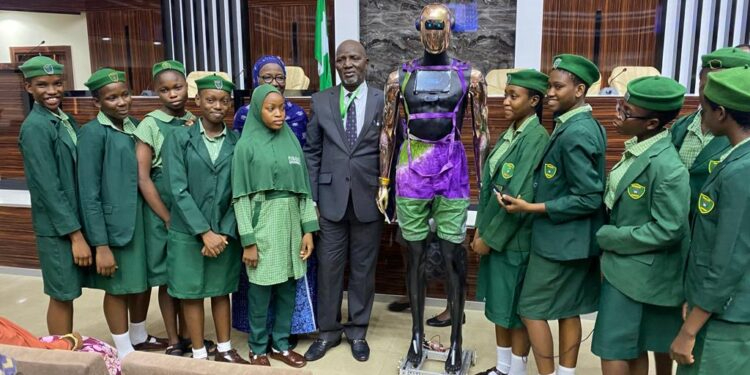The story of how some remarkable students of Federal Government Girls College, Sagamu, Ogun State built a humanoid robot that can move some distance, stretch its hand, shake hands and interact with people was astounding. However, it was not just another evidence of how brilliant the average Nigerian youth is but the bravery and doggedness of the young impressionable mind in a tough clime like Nigeria.
The name of the robot is Okikiola-Sagamu A.K.A Kiki-Saggy is interesting as it recognizes that talents exist also in such perceived rural setting. The robot is six feet in height, 60 kilograms in weight and has a maximum speed of 10 km/hour.
As shown in a demonstration shared on Twitter, Kiki Saggy boasts a half-human, half-robot design. It features a head, an arm, and two legs that facilitate movement. This ingenious creation can recognise faces, engage in handshakes, exchange pleasantries, dictate items, and more.
The robotics innovation project was recently presented to the permanent secretary, Federal Ministry of Education, Andrew David Adejo, by the school’s principal and director, Dr Muyibat Olodo, in Abuja.
The objective of the programme, according to the Principal, is to introduce young girls to Artificial Intelligence (AI), coding, machine learning and robotics world and motivate them to make a choice of career in any of the aforementioned related courses.
Olodo, who has flair for technology, most especially, coding Robotics and Artificial Intelligence, led the College’s Robotics team, consisting of some students and members of staff. She said, “Artificial Intelligence, Machine Learning and Robotics are sowing good seeds in Federal Unity Colleges (FUCs).”
This newspaper is pleased by this positive development in the nation’s secondary school system. We, therefore, commend the school management for not just embarking on this inspiring project but completing it. Although, it helped that the school director is a technology enthusiast, according to the media report, still it takes a lot of sacrifice to believe in the potential of young women. This outstanding feat brings to mind the other innovations carried out by young Nigerians.
Somewhere in Mabushi, a crossroads area between the inner and outer districts of Abuja, Nigeria, Uniccon Group, a two-year-old Nigerian technology firm, has built a humanoid: a six-foot-tall multilingual human-like robot called Omeife. From an idea that was conceptualised in 2020 to a back-and-forth construction—slow wins and quick-succession learning—that stretched across two years, Omeife, built as a female Igbo character that understands and speaks eight different languages, is now a product ready to meet the world.
In 2012, four teenage girls invented the urine-powered generator as a safer and more sustainable solution to Nigeria’s failing electricity system some years ago. Also, videos on social media are replete with youths, with little or no posh education, displaying cars, drones and even tricycles they either built or remodeled.
It is most encouraging, in our opinion, that the girls pulled off a humanoid project of this magnitude, considering that the technology for it is relatively new. However, it is not necessarily surprising because the genius of the average Nigerian has since become well known.
In the meantime, we observe with delight that the entertainment sector, dominated by the young and upwardly mobile, has been receiving deserved attention as a measure of the creative and enterprising power of that segment of the population. We also believe that even in other sectors, with proper attention, the Nigerian youth can match their peers anywhere in the world.
It is our considered opinion that the scientific creative energy of young Nigerians needs to be awoken and fast. Agreed it might come at a higher level of cost compared to the entertainment sector, however, for decades, history has proven that the backbone of every influential country is its technological might. And this is driven largely by the proper channeling of the creative brilliance and energy of youths.
Similarly, Nigeria, in our view, needs to adopt a definite strategy on how to repackage the nation’s public education from primary to tertiary levels. This, no doubt, requires a robust funding plan but much more commitment from an elite, who seem to have lost faith in the country’s educational system, which explains the large number of Nigerian students abroad.
In addition to that, a keen interest should be paid to the science and technology sub sector. Young Nigerians who have a flair or gift for the sciences should not be allowed to lose such gifts to the “advanced countries” as we have seen over the decades.
We, therefore, urge the private sector to develop keener interest in the science and technology subsector. We believe they can make a budget for this sector as part of their corporate social responsibility (CSR).
We’ve got the edge. Get real-time reports, breaking scoops, and exclusive angles delivered straight to your phone. Don’t settle for stale news. Join LEADERSHIP NEWS on WhatsApp for 24/7 updates →
Join Our WhatsApp Channel










